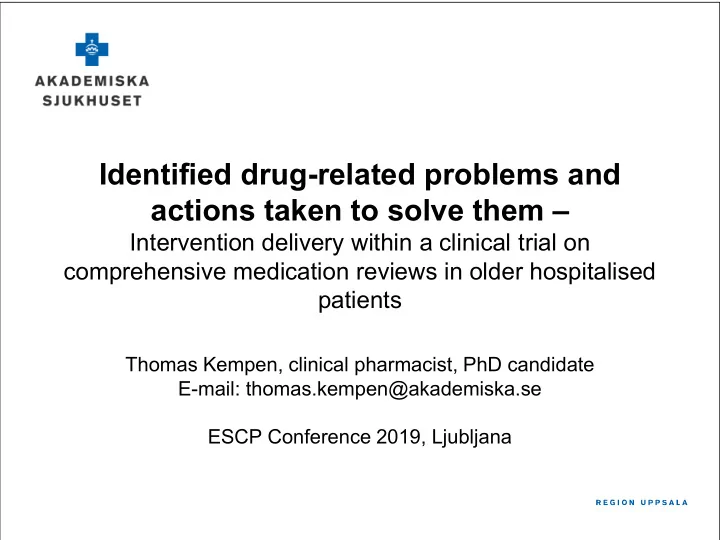

Identified drug-related problems and actions taken to solve them – Intervention delivery within a clinical trial on comprehensive medication reviews in older hospitalised patients Thomas Kempen, clinical pharmacist, PhD candidate E-mail: thomas.kempen@akademiska.se ESCP Conference 2019, Ljubljana
How were medication reviews defined? How were these interventions delivered?
Content • Background • MedBridge trial • Process evaluation → Intervention delivery • Aim of this study • Methods • Results • Discussion and conclusion
Background: MedBridge trial [Kempen et al. 2017] Aim: To study the effects of… • hospital-initiated comprehensive medication reviews (CMRs) incl. post-discharge follow-up • solely hospital-based CMRs • usual care (control) … on older patients' healthcare utilisation → results expected in 2020
Background: MedBridge CMR: pharmacist-led • Medication reconciliation with patient upon hospital admission: ➢ Identify discrepancies in medication list • Medication review in relation to patient information and electronic health record: ➢ Identify drug-related problems (DRPs) • Discussion with ward physician and patient: ➢ Correct discrepancies ➢ Propose and implement actions to solve DRPs
Background: Process evaluation • Trials of complex interventions often criticized → H ow to interpret the trial’s results? • Process evaluation recommended [Moore et al. 2015] E.g.: • Did all participants receive the intended interventions? • How were the interventions delivered?
Aim of this study • To assess the intervention delivery within the MedBridge trial, in terms of… • number and types of identified medication discrepancies, DRPs and actions to solve DRPs within the CMRs
Methods: Setting • Setting: • 8 wards, 4 hospitals
Methods: Population and exposure • Inclusion criteria: • ≥65 years old, admitted to study ward • Exclusion criteria: • CMR <30 days, palliative care, one-day admission, ⅓ not residing in region • Intervention 1 (n=922): CMR during hospital stay • Intervention 2 (n=823): CMR during hospital stay + post-discharge follow-up • Control (n=892): Usual care
Methods: Data collection • Retrospective assessment of electronic health record: written notes, medication list ➢ Identified discrepancies → corrected? ➢ Identified DRPs ➢ Proposed actions to solve DRPs → implemented? • Classification DRPs: Hepler & Strand [Strand et al. 1990] ➢ ➢ Proposed actions: SFPC [Allenet et al. 2006]
Methods: Data analysis • Descriptive statistics
Results: Baseline characteristics • Characteristics of included patients (n=581): Age, median years (range) 81 (65-103) Gender, % female 53% Medications*, median (range) 9 (0-32) *prescribed, incl. “as required”
Results: Medication discrepancies • 1.1 (range 0-12) discrepancies per patient (n=581) • 50% at least one discrepancy • 77% corrected
Results: Drug-related problems (DRPs) • 2.0 (range 0-10) DRPs per patient (n=581) • 75% at least one DRP 250 17% 17% 200 13% 150 Number 10% 10% 9% 8% 100 6% 6% 4% 50 0
Results: Actions to solve DRPs • 2.1 (range 0-11) proposed actions per patient (n=581) • 72% implemented 200 20% 19% 180 18% 160 15% 140 12% 120 100 8% 80 5% 60 3% 40 20 0 Implemented actions Serie1
Discussion: • Large variation in identified discrepancies (3.4-97% of patients) and DRPs (0.1-11/patient) in literature [Graabaek et al. 2013, Lehnbom et al. 2014, Jokanovic et al. 2017] • 1.1 discrepancies + 2.0 DRPs similar to many studies • 72-77% implementation rate seems good • Clinical relevance and follow-up unclear Conclusion: • The CMRs within the MedBridge trial have been well- delivered
Thank you for listening! More information: www.akademiska.se/medbridge E-mail: thomas.kempen@akademiska.se Collaborating institutions:
References • Allenet B , Bedouch P, Rose FX, Escofier L, Roubille R, Charpiat B, et al. Validation of an instrument for the documentation of clinical pharmacists' interventions. Pharm World Sci. 2006 Aug;28(4):181-8. • Jokanovic N , Tan EC, Sudhakaran S, Kirkpatrick CM, Dooley MJ, Ryan-Atwood TE, Bell JS. Pharmacist-led medication review in community settings: An overview of systematic reviews. Res Social Adm Pharm. 2017 Jul - Aug;13(4):661-685. doi: 10.1016/j.sapharm.2016.08.005. • Kempen TGH , Bertilsson M, Lindner KJ, Sulku J, Nielsen EI, Högberg A, et al. Medication Reviews Bridging Healthcare (MedBridge): Study protocol for a pragmatic cluster-randomised crossover trial. Contemp Clin Trials. 2017 Oct;61:126-132. doi: 10.1016/j.cct.2017.07.019. • Lehnbom EC , Stewart MJ, Manias E, Westbrook JI. Impact of medication reconciliation and review on clinical outcomes. Ann Pharmacother. 2014 Oct;48(10):1298-312. doi: 10.1177/1060028014543485. • Moore GF , Audrey S, Barker M, Bond L, Bonell C, Hardeman W, et al. Process evaluation of complex interventions: Medical Research Council guidance. BMJ. 2015 Mar 19;350:h1258. doi: 10.1136/bmj.h1258. • Strand LM , Morley PC, Cipolle RJ, Ramsey R, Lamsam GD. Drug-related problems: their structure and function. DICP. 1990 Nov;24(11):1093-7.
Recommend
More recommend